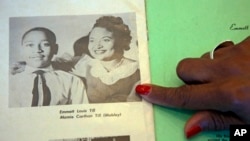The woman at the center of the trial of Emmett Till’s alleged killers has acknowledged that she falsely testified he made physical and verbal threats, according to a new book.
Historian Timothy B. Tyson told The Associated Press on Saturday that Carolyn Donham broke her long public silence in an interview with him in 2008. His book, The Blood of Emmett Till, comes out next week.
“She told me that ‘Nothing that boy did could ever justify what happened to him,’” said Tyson, a Duke University research scholar whose previous books include Blood Done Sign My Name and Radio Free Dixie.
Brutal, galvanizing event
Emmett Till was a 14-year-old black tortured and killed in 1955 in Mississippi after allegedly whistling at a white woman, then known as Carolyn Bryant.
His murder became national news, was a galvanizing event in the civil rights movement and has been the subject of numerous books and movies. During the trial, Bryant said that he had grabbed her, and, in profane terms, bragged about his history with white woman. The jury was not present when she testified.
Donham’s then-husband, Roy Bryant, and his half brother, J.W. Milam, were acquitted by the all-white jury. Both men, who later told Look magazine they did murder Till, have since died. Milam’s widow, Juanita Milam, would later tell the FBI she believed that Carolyn Bryant had fabricated her story. Juanita Milam died in 2014. The Justice Department re-examined the case a decade ago, but no one was indicted as a murderer or an accomplice.
Tyson said that he spoke with Donham after her daughter-in-law, Marsha Bryant, contacted him. Bryant had read Blood Done Sign My Name, about a racist murder during his childhood in Oxford, North Carolina, and invited Tyson to meet with her and Donham.
Historian interviews Donham
Tyson said he and Donham had two conversations that both lasted two-three hours and that he planned at the time to place the material in the archives at the University of North Carolina. Asked why he waited so long to publicize his findings, he responded that historians think in different terms than journalists.
“I’m more interested in what speaks to the ages than in what is the latest media thing,’’ he said.
He added that he wasn’t sure whether Donham knew about the book. He said he had fallen out of touch with the family and that when he last spoke with Bryant, a few years ago, she said Donham was in poor health.
On Saturday, the Emmett Till Legacy Foundation shared news reports about the book and asked if Donham would have the “decency and courage” to speak with Till’s relatives.





